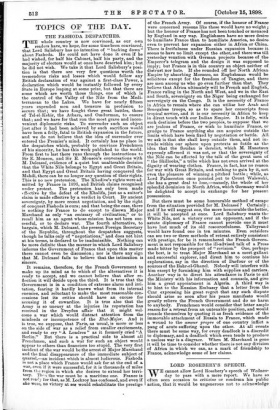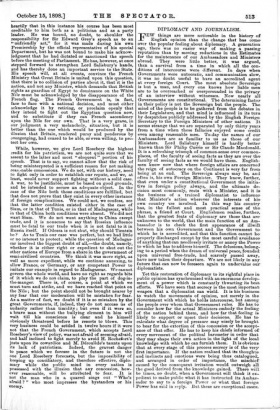LORD ROSEBERY'S SPEECH.
NVE cannot allow Lord Rosebery's speech of Wednes- day to pass with a mere report. We have so often seen occasion to criticise or condemn his public action, that it would be ungenerous not to acknowledge heartily that in this instance his course has been most creditable to him both as a politician and as a party leader. He was bound, no doubt, to shoulder the responsibility for Sir Edward Grey's speech as to an "unfriendly act," for it was made during his own Premiership by the official representative of his special Department, but he was not bound to make his acknow- ledgment that he had dictated or sanctioned the speech before the meeting of Parliament. He has, however, at once stepped forward to strengthen Lord Salisbury's hands, and has thereby done an important service to the State. His speech will, at all events, convince the French Ministry that Great Britain is united upon this question, that there is no collision of parties about it, that it is the nation, and not any Minister, which demands that British rights as guardian of Egypt to dominance on the White Nile must be acknowledged by the disappearance of the French flag. The French Government is, in fact, face to face with a national decision, and must either acknowledge it by retiring, or proclaim openly that they intend to fight out the Egyptian question now, and to substitute if they can French ascendency upon the Nile for our own. That is a very grave, in our judgment a very melancholy, situation, but it is better than the one which would be produced by the illusion that Britain, rendered pursy and ponderous by overgorging, had ceased to be able, or even willing, to pro- tect her own.
While, however, we give Lord Rosebery the highest credit for his patriotism, we are not quite sure that we assent to the latter and most " eloquent " portion of his speech. That is to say, we cannot allow that the risk of being misinterpreted is a sufficient reason for not making reasJnable concessions. We do not, with our history, need to fight only in order to establish our repute, and we, at least, would never support fighting without a solid case. A. war, to be justifiable, must be based on good grounds, and be intended to secure an adequate object. In the case of the Nile both those conditions are fulfilled, but that does not prove that they exist in every other instance A foreign complications. We could not, we confess, see that the latter condition existed either in the case of Siam, or in that of Tunis, or in that of Madagascar, while in that of China both conditions were absent. We did not want Siam. We do not want anything in China except trade, and it is nonsense to say that Russian influence must be fatal to our trade when it is not fatal to it in Russia itself. If Odessa is not shut, why should Tientsin be ? As to Tunis our case was perfect, but we had little or no interest to protect ; while the question of Madagas- car involved the biggest doubt of all,—the doubt, namely, whether it is either right or expedient to shut out the other nations of Europe from a share in the government of semi-civilised countries. We think it was more right, as well as more expedient, while we continue annexing, to allow France, or Germany, or any competent Power to imitate our example in regard to Madagascar. We cannot govern the whole world, and have no right as regards bits of it which we do not claim, to play the part of dog-in- the-manger. There is, of course, a. point at which we must turn and strike, and we have reached that point on the Nile ; but the point should not be brought nearer by any fear that our moderation will be mistaken for fear. As a matter of fact, we doubt if it is so mistaken by the great Governments, if, indeed, they do not accuse us of audacity rather than timidity ; but even if it were so, a brave man without the bullying element in him will wait till his conscience is clear and he himself obviously threatened before he resorts to blows. This very business could be settled in twelve hours if it were not that the French Government, which accepts Lord Rosebery's view of policy, was not afraid of seeming afraid, and half inclined to fight merely to avoid H. Rochefort's jests upon its cowardice and M. D6roulede's taunts upon its lack of patriotism. Indeed, the gravest danger to peace which we foresee in the future is not the one Lord Rosebery forecasts, but the impossibility of keeping up conciliatory, and therefore effective, diplo- macy while the public mind in every nation is possessed with the illusion that any concession, how- ever reasonable, will be attributed to fear. It is not the man who in a quarrel sings out "Who's afraid ? " who most impresses the bystanders or his enemy.







































 Previous page
Previous page